|
|
|
Sort Order |
|
|
|
Items / Page
|
|
|
|
|
|
|
| Srl | Item |
| 1 |
ID:
178463
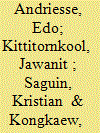

|
|
|
|
|
| Summary/Abstract |
In this article, we compare four fishing-based areas in Thailand and the Philippines to examine if and how small-scale fishing communities are able to escape marginalisation. Three questions guide our inquiry: (i) How have fishing communities been affected by overfishing, climate change and other pressures? (ii) What adaptive strategies have these communities employed to mitigate socio-economic and environmental challenges? (iii) What has been the impact of these strategies on (escaping) marginalisation? Through a survey of 393 fishing-based households and semi-structured interviews with 59 key informants we find an uneven mixture of drivers, strategies and impacts. Respondents varyingly attribute declining fish catch to illegal fishing, overfishing, population increase, climate change and pollution. The case studies illustrate various degrees of adaptive successes that result from integration of top-down and bottom-up initiatives, and availability and access to livelihood strategies. However, the impact of adaptive strategies on overcoming marginalisation remains meagre and constrained by, among others, the power of illegal and commercial fishing and the absence of integrated spatial planning. We call for policy interventions and further research that takes into account the integration of top-down and bottom-up institutions, and the multiple dimensions and spaces of the drivers that shape fisherfolk marginalisation.
|
|
|
|
|
|
|
|
|
|
|
|
|
|
|
|
| 2 |
ID:
178464


|
|
|
|
|
| Summary/Abstract |
This paper reviews and critiques the literature on family engagement programmes in higher education, from the perspective of issues that may affect the design of programmes serving Native Hawaiian and Pacific Islander students and their families. While there is compelling research suggesting that increasing students' family members' engagement with higher education will benefit students, it is unclear whether the concept of family engagement as it is conceived in western educational contexts can be universally and unproblematically applied in Pacific contexts. Recommendations for best practices in family engagement programme design highlight communication efforts with parents that can be characterised as fundraising and ‘friendraising’, but do not address issues specific to the experiences of under-represented groups in higher education. Drawing on the literature and experiences of indigenous and other under-represented students, and incorporating insights from literature on decolonising methodologies, we present considerations for authentic and culturally responsive family engagement for Native Hawaiian and Pacific Islander students, families and communities.
|
|
|
|
|
|
|
|
|
|
|
|
|
|
|
|
| 3 |
ID:
178462


|
|
|
|
|
| Summary/Abstract |
Typhoon Yolanda brought major devastation to the local communities and infrastructure and also reshaped social structures and networks in the Philippines. During the immediate recovery process, bridging, bonding and linking social capital have had differential impacts and outcomes on how communities cope with the aftermath of the disaster. This article investigates the interplay between the various types of social capital and their contributions to immediate coping strategies of Typhoon Yolanda communities. This article also evaluates the complexity of defining social capital in a disaster context. In particular, it unpacks the blurring of the bridging and linking social capital at the immediate stage of rehabilitation in a post-disaster context and its impacts on the social fabric of the communities. We deduce from this case study the social capital strategies necessary for a speedy recovery process both economically and socially for disaster-affected communities.
|
|
|
|
|
|
|
|
|
|
|
|
|
|
|
|
| 4 |
ID:
178466
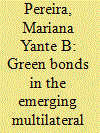

|
|
|
|
|
| Summary/Abstract |
The article aims at discussing the rise of the green bonds in the context of the multilateral development banks, by problematizing their threats and potentialities to be an alternative to the existing financing system within the sustainable development agenda. It scrutinises the development rhetoric behind the emergence of multilateral development banks in the Global South, specifically in the Asian context, and attempts to foster alternatives to the Bretton Woods institutions. The two largest initiatives in that sense – the New Development Bank and the Asian Infrastructure Investment Bank – started in Asia and also target countries in the region, giving the growing influence of China and the enhancement of interregional cooperation through the BRICS countries, currently led by China, India and Russia. The paper argues that there is limited scope for the promised innovations in both project assessment and the role of private capital, given the prioritisation of infrastructure as the premise to achieving the right to development among emerging and least-developed economies. The research departed from the quantitative and qualitative analysis of the projects funded by the New Development Bank and the Asian Infrastructure Investment Bank, from their inception until 2018, considering the approach that such institutions have taken to the social and environmental standards from their normative framework.
|
|
|
|
|
|
|
|
|
|
|
|
|
|
|
|
| 5 |
ID:
178459
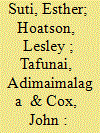

|
|
|
|
|
| Summary/Abstract |
This paper analyses the ‘Simbo for Change’ project in the Western Province of Solomon Islands, a collaboration between Simbo leaders and a Samoan non-governmental organisation (NGO), with funding provided by the Australian aid programme. We explore the role of local leadership in catalysing an island-wide community development project that has generated new livelihoods opportunities and led to greater community cohesion and more proactive governance. By mobilising around a ‘collective subject’ (Simbo as an island community), the project allowed existing skills and practices to be revalued and extended, particularly in relation to chiefly governance and the standing of women in the community. While mobilising the island scale was important in building social cohesion and support for livelihoods activities, this was not a parochial identity but was redefined by stronger connections to off-island markets, organic accreditation for Simbo, renewed interest from provincial and national government authorities and by the enduring trans-Pacific friendships established with the Samoan NGO and its trainers. The case study provides an example of the constructive potential of the island scale in Melanesia, whereas other recent studies of similar scale-making processes have focused on violent conflict generated by industrial scale mining.
|
|
|
|
|
|
|
|
|
|
|
|
|
|
|
|
| 6 |
ID:
178460
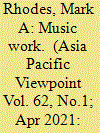

|
|
|
|
|
| Summary/Abstract |
Recent scholarship has opened questions as to the everyday actions of the Khmer Rouge and those living under the regime which led to the Cambodian Genocide. Current work examines the critical cultural geographies of the Khmer Rouge: photography, poetry and music, for example. Music specifically has an interesting underpinning, as it was previously understood to be have been eradicated in the genocide as the standard narrative has us believe. This paper instead investigates the pieces of evidence that exist, which explain the use of music by the Khmer Rouge. I explore the geographies of music beyond the lyrics and look at the transformation and use of music in Cambodia and Democratic Kampuchea. What elements of traditional Khmer music were used during the regime? What modifications occurred to the music of Cambodia during the regime, and how did the Khmer Rouge modify existing Cambodian (and other) music to best fit their desired uses (state-building and genocide)? This paper goes beyond traditional geographies of music, which rely on lyrical analyses, to bring an ethnomusicological perspective to the work of music and its role in shaping the idea of the Democratic Republic of Kampuchea.
|
|
|
|
|
|
|
|
|
|
|
|
|
|
|
|
| 7 |
ID:
178458
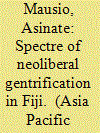

|
|
|
|
|
| Summary/Abstract |
This article seeks to examine Fiji's current housing crisis against the backdrop of neoliberal urbanism. In doing so, the article offers a fresh new perspective on the marginalisation, displacement and outright exclusion of the urban poor from the inner city areas of Suva. Among the trademark growth problems experienced by neoliberal cities across the globe, the crisis of urban housing affordability is perhaps more pronounced in Suva given economies of scale and constraints in Fiji's land tenure system. This article seeks to highlight that Suva's inner city spaces are being transformed along the lines of market fundamentalism and that this will exacerbate the social exclusion and displacement of Suva's poor.
|
|
|
|
|
|
|
|
|
|
|
|
|
|
|
|
| 8 |
ID:
178465


|
|
|
|
|
| Summary/Abstract |
Commodity crops are redefining land use and rural smallholder livelihoods across Asia. These crops often have boom-bust cycles with important implications for the drivers of farmer entry into and exit from particular cash crop opportunities. This paper offers a comparative analysis of the boom-bust processes of three popular spice crops cultivated in Yunnan Province, southwest China. Drawing from agrarian frontiers and rural livelihoods literature, we disentangle the vulnerability contexts associated with black cardamom, cinnamon and star anise production, finding that farmers cultivating these spices face a combination of interlocking forms of vulnerability. Despite the monetary potential that each crop offered during its ‘boom’, the associated environmental, economic and political vulnerabilities caused most farmers to exit their production, responding with myriad on-farm and off-farm diversification strategies. Using a multi-sited ethnographic approach, we draw on 52 in-depth interviews with ethnic minority cultivators, spice traders and local government officials to untangle the complexities associated with cash crop production in this agrarian frontier, the interwoven vulnerabilities that result in their ‘busts’ and the coping and adaptation strategies that smallholder farmers employ. Our findings underline the importance of disaggregating farmer vulnerabilities and the need for more nuanced policy responses to adequately support small-scale farmers.
|
|
|
|
|
|
|
|
|
|
|
|
|
|
|
|
| 9 |
ID:
178461


|
|
|
|
|
| Summary/Abstract |
With large tracts of forested land planned for, or already converted to, industrial palm oil concessions, there is a need to better understand the gendered implications for, and responses by, communities affected by such landscape change. This paper examines the differentiated gendered responses and livelihood strategies of Dayak Modang women and men in a hamlet in East Kalimantan, Indonesia, surrounded by industrial palm oil plantations. Informed by feminist political ecology, we investigate how the compounding impact of industrial oil palm – the basis and outcome of enclavement – curtails livelihood options and reinforces gender differentiation in terms of access to and use of customary resources. Gendered inequalities and food insecurity dynamics emerge as a result. We show how, however, that despite gendered exclusions, Dayak Modang women use their own knowledge and practices to diversify livelihoods to negotiate emerging constraints over resource access and use. Our paper demonstrates that ways in which Dayak women ‘sustain livelihoods’ reflects forms of everyday negotiations and resistance to intensifying constraints over life and livelihood.
|
|
|
|
|
|
|
|
|
|
|
|
|
|
|
|
|
|
|
|
|